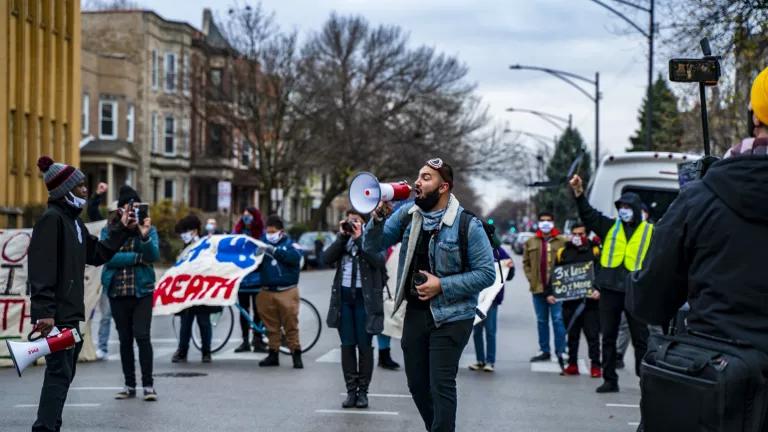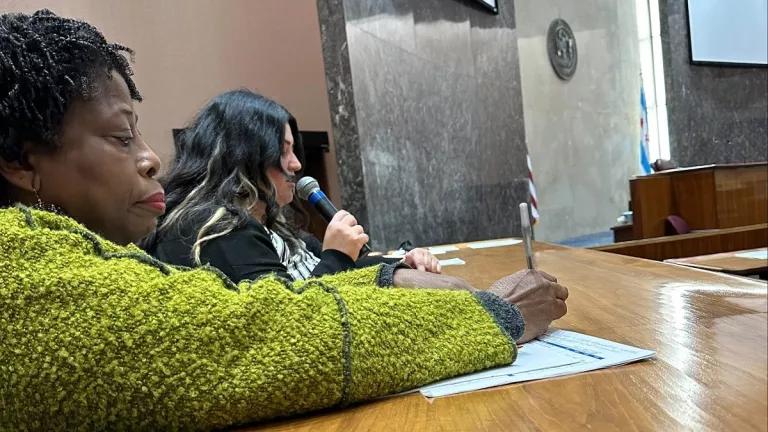Chicago Officials Halt Permit Process for Move of General Iron’s Notorious Metal Shredding Operation to Southeast Side
This marks a major step forward in dismantling the environmental racism that has plagued the neighborhood for decades.

Oscar Sanchez, cofounder of the Southeast Youth Alliance, protesting against General Iron’s metal shredding plant near Mayor Lightfoot's home in Chicago
VICTORY: On February 18, 2022, the Chicago Department of Public Health announced that it is denying General Iron’s operating permit. This brings an end to a years-long struggle between Southeast Side residents and the massive metal shredding operation that wanted to relocate to their majority working-class, Latino community. “Although we are celebrating this decision, the community continues to deal with the toxic legacy that has allowed pollution to accumulate in our community,” reads the coalition statement. “We will not stop fighting for our right to clean air.”
This marks a major step forward in dismantling the environmental racism that has plagued the neighborhood for decades.
Chicago officials announced late Friday that the city would stop the permitting process that would have allowed General Iron to relocate its notorious metal shredding plant from the affluent, predominantly white neighborhood of Lincoln Park to a working-class Latino and Black community on Chicago’s Southeast Side. The decision—which comes after U.S. Environmental Protection Agency administrator Michael Regan called on the city to stop the process and to conduct an environmental justice analysis—is a major step forward for local residents and environmental justice groups who have fought the operation’s proposed move for years.
“If General Iron’s business was too dirty for Lincoln Park residents, it’s too dirty for residents on Chicago’s Southeast Side,” says Gina Ramirez, NRDC’s Midwest outreach manager and a Chicago resident. “Today’s victory was hard won by Chicagoans who chose to fight for the health of their families and neighbors.”
Shuttered at the end of last year after more than a century in use, General Iron’s massive Lincoln Park operation broke down metal waste, often from old cars—spewing toxic pollutants into the air, and residents complained that they were coating everything from nearby porches to playgrounds in oily film and metallic dust. General Iron, which was also responsible for a number of fires and explosions in recent years, including a major explosion last May, had been shut down for public health citations.
After years of pushback from Lincoln Park residents, the company announced its plan to shutter the plant by the end of 2020—making room for a multibillion-dollar residential and retail development—and to move its metal-shredding operations to the Southeast Side, which is already overburdened by industrial pollution. The proposed new location is also nearby an elementary and high school.
The proposal prompted fierce backlash from nearby residents, including a weeks-long hunger strike by a number of local activists and continued protests from a coalition of environmental justice groups, among them the People for Community Recovery, Southeast Environmental Task Force, Southeast Side Coalition to Ban Petcoke, Southeast Youth Alliance, United Neighbors of the 10th Ward, Bridges/Puentes, Southeast Side Educators for Environmental Justice, George Washington High School Student Voice Committee, Alliance of the Southeast, and NRDC.
“While we’re celebrating this win, it’s just a first step,” Ramirez says. “What we need next is real reform over how land-use permitting decisions get made and who gets to make them. Impacted communities need a seat at the table—and conversations must prioritize public health, not profits.”



